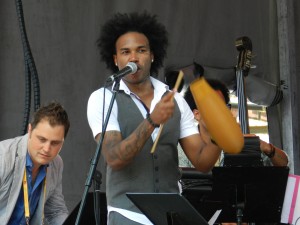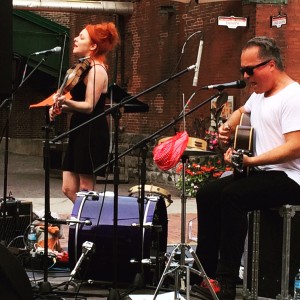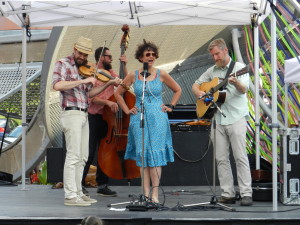
On not getting gigs or grants.
 The work I do means saying “No” a lot more than “Yes.” Whether I’m working as a booker or jurying a grant or award, the ability to say no clearly, politely, and unequivocally is one of the most valuable skills I’ve developed.
The work I do means saying “No” a lot more than “Yes.” Whether I’m working as a booker or jurying a grant or award, the ability to say no clearly, politely, and unequivocally is one of the most valuable skills I’ve developed.
As AD of the Peterborough Folk Festival, I’d generally get about 700-1000 submissions from musical acts, and I’d have 25 or so slots to fill. At minimum, I’d be listening, evaluating, and saying “No” 675 times to hopeful artists who’d poured their time, energy, sweat, and cash into their work. The jury for Artsweek Peterborough ((A festival which I saved from certain death, restructured, and ran for 2 years.)) got 12 submissions in 2012, and accepted 6, which are great odds. But still, I know and have worked with almost every artist or group that submitted that year; writing those rejection letters meant saying “No” to people who I love, and whose work I believe in.
These days I’m not taking formal artists submissions, ((Just booking from my deep mental pool of artists, especially people that I haven’t had a chance to work with before.)) but I still have plenty of conversation every week wherein I have to gracefully let people down or say no to them; I sometimes joke that 90% of my job is to say no to people. No, your stage sound can’t exceed 85 dB. No, you can’t hold your flashmob engagement proposal here. No, you can’t drive that into there.
No, I’m sorry, I’m not booking your band for our music series this year.
 I’m an artist too, and I know how much artistic rejection or criticism stings. And I know how sometimes the frustration boils over and you end up ranting to whomever will listen about how corrupt and unfair the whole process is. In a situation like submitting a grant or applying to a festival, you often don’t know the people evaluating your work, and it’s easy to assume that when you get rejected, it’s because they’re accepting their friends, or artists who conform to a more populist or hipster voice, or that there’s some language you don’t speak that the successful applicants do. ((Sometimes that is true, but not as often as you think. I promise.))
I’m an artist too, and I know how much artistic rejection or criticism stings. And I know how sometimes the frustration boils over and you end up ranting to whomever will listen about how corrupt and unfair the whole process is. In a situation like submitting a grant or applying to a festival, you often don’t know the people evaluating your work, and it’s easy to assume that when you get rejected, it’s because they’re accepting their friends, or artists who conform to a more populist or hipster voice, or that there’s some language you don’t speak that the successful applicants do. ((Sometimes that is true, but not as often as you think. I promise.))
Here’s a hard truth: sometimes, your application just wasn’t very good.
When experienced professional artists and arts administrators look at it, it’s clear to them (though maybe not to you) that you’re not ready. It doesn’t mean you’re a terrible artist, or that your work sucks; it just means that you’re still developing, as an artist.
And here’s a second hard truth: there are, and will always be, a lot of artists out there who are better than you. They’ve got better technique, or a clearer way of writing about it, or better marketing materials, or a better grasp of how to approach bookers, juries, and Artistic Directors.
And here’s a third: The arts are a business, regardless of all the lovely platitudes in the world, and if you’re aiming to be a professional artist, you’ve got to work on the ‘professional’ bit as much or more than you work on the ‘artist’ bit. If you want to be a hobbyist, go ahead, but please don’t waste everyone’s time complaining that you’re not getting arts grants or shows; you aren’t really working for them, and you don’t deserve them. ((I know that’s going to stir up a few people’s ire; I respect your work, but I’m not going to fund your leisure pursuit, any more than I’d fund hobby knitters or hobby car-tinkerers. This article isn’t aimed at hobbyists.)) The pool of available funding is very small, and the number of people who’d like to get some of those funds is very large.
 We (bookers, jurors, etc.) have to turn lots of people down, and more often than not, it’s going to be you. But it’s not always going to be you. If you give up after your first rejection and never apply for a grant again, then yes, your rejection rate is going to be 100%. But if you revise, re-think, and re-apply, odds are your next application will be better. ((And it’s totally worth applying, even if you don’t get the grant, because it’s important to be able to think clearly about your work and why you do it, which is usually what a grant application will ask you to explain.)) And just like your art, practice makes perfect – or at least, practice makes improvements. ((Keep in mind, too, that government funders want to give grants to artists outside of major cities, but that the numbers of applicants from a city like Toronto or Montreal is larger than from a city like Peterborough or Cornerbrook, and so it will always look like big cities get favoured over little towns.))
We (bookers, jurors, etc.) have to turn lots of people down, and more often than not, it’s going to be you. But it’s not always going to be you. If you give up after your first rejection and never apply for a grant again, then yes, your rejection rate is going to be 100%. But if you revise, re-think, and re-apply, odds are your next application will be better. ((And it’s totally worth applying, even if you don’t get the grant, because it’s important to be able to think clearly about your work and why you do it, which is usually what a grant application will ask you to explain.)) And just like your art, practice makes perfect – or at least, practice makes improvements. ((Keep in mind, too, that government funders want to give grants to artists outside of major cities, but that the numbers of applicants from a city like Toronto or Montreal is larger than from a city like Peterborough or Cornerbrook, and so it will always look like big cities get favoured over little towns.))
There are lots of organizations and resources available to help professional artists develop their arts business skills, and many of them are free. Granting agencies will answer your questions at any time, and are generally able to tell you reasons why your grant wasn’t successful. Talk to other artists, look around your community, swallow your pride, and ask for help. You’d be amazed at how many people will be willing to give you advice or answer your questions if you ask.
 Because here’s the secret, the hidden truth behind almost all granting agencies and arts organizations and bookers and promoters: these places are almost always staffed by artists and mega-fans. The skills they have could be put to use in almost any field for decent pay and benefits, but they work in the arts, where pay is usually skimpy and benefits non-existent. Before they took their job, they were probably you. Or maybe they wish they were you. They do the work they do because they want to help artists, because they believe in the arts, and because they don’t want to do anything else. They aren’t The Enemy; they are your co-workers.
Because here’s the secret, the hidden truth behind almost all granting agencies and arts organizations and bookers and promoters: these places are almost always staffed by artists and mega-fans. The skills they have could be put to use in almost any field for decent pay and benefits, but they work in the arts, where pay is usually skimpy and benefits non-existent. Before they took their job, they were probably you. Or maybe they wish they were you. They do the work they do because they want to help artists, because they believe in the arts, and because they don’t want to do anything else. They aren’t The Enemy; they are your co-workers.
Without a promoter, without a venue, without funding from somewhere, even the best and brightest have no audience and no resources. Lighting designers, choreographers, curators, sound technicians, and granting agencies; take all of those away and it doesn’t matter how hard you worked to refine your craft, because almost no one will see it. When you get your first paid show, your first successful grant, a person or a group of people decided that you were someone to invest in, someone to take a risk on. Someone whose work showed promise, or skill, or excited them somehow.
In my experience, the most successful artists are generally very professional, very nice, very hardworking people. The Diva or Rockstar don’t make it very far any more, because no one wants to work with a high-maintenance or rude jerk. The arts are a social business, and bad behaviour in a venue in Yellowknife would get back to me in Peterborough in a heartbeat thanks to a wide network of friends and acquaintances across the country and around the world. Having an off day is one thing; embracing a bitter attitude about not getting gigs, grants, or other opportunities can be a self-fulfilling prophecy – who wants to hang out with someone who bitches about work all of the time? And who wants to book them? Recognize that rejection is part of the process, and that everyone who’s ahead of you, career-wise, has seen hundreds or thousands of disappointments, losses, and rejections.
There will be days when it gets you down; it’s understandable. But don’t let that take over your career and life – it’s no way to live, and it’s certainly no way to thrive.





4 Comments
Jory Nash
A well written and helpful article, Candace!
Bob LeDrew
Great post, Candace. it’s unavoidable that in so many arts fields, the cost of playing is the reality of rejection. It’s up to those who play to continuously realize that the rejections are a cost of doing business just like postage or web hosting, except they are a psychological cost rather than financial.
Peter Boyer
I always regard a performance opportunity at a festival as a privilege, and the highest form of acceptance for my art.
Vishwas Thoke
A great inspirational and well written piece Candace! ….’ Recognize that rejection is part of the process…’ drives home the point beautifully! Thanks.